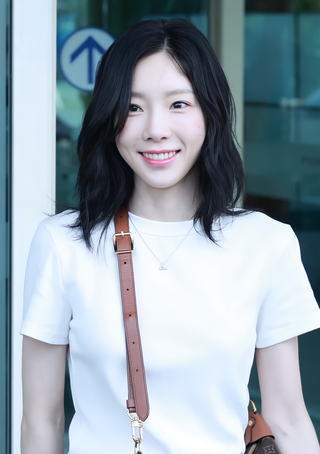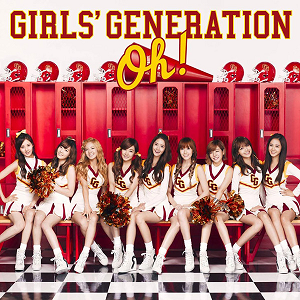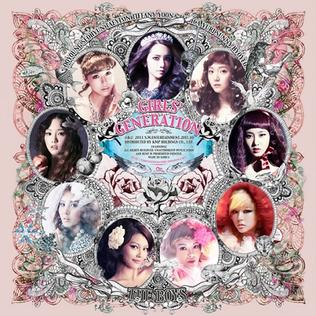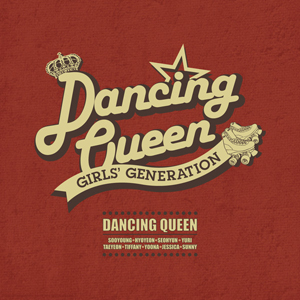
Girls' Generation, also known as SNSD, is a South Korean girl group formed by SM Entertainment. The group is composed of eight members: Taeyeon, Sunny, Tiffany, Hyoyeon, Yuri, Sooyoung, Yoona, and Seohyun. Originally a nine-piece ensemble, member Jessica departed from the group in September 2014. Among the most known South Korean figures and successful K-pop groups worldwide, Girls' Generation has earned numerous accolades and the honorific nickname "The Nation's Girl Group" in their home country.

Kim Tae-yeon, known mononymously as Taeyeon, is a South Korean singer. She debuted as a member of girl group Girls' Generation in August 2007, which went on to become one of the best-selling artists in South Korea and one of the most popular K-pop groups worldwide. She has since participated in other SM Entertainment projects, including Girls' Generation-TTS, SM the Ballad, Girls' Generation-Oh!GG, and the supergroup Got the Beat.

South Korea-based girl group Girls' Generation have released ten studio albums, two live albums, four extended plays (EPs), and twenty-eight singles. As of November 2012, Girls' Generation has sold over 4.4 million albums and 30 million digital singles. The group has sold over 1.74 million albums in South Korea as of December 2014, and 3.48 million records, including over 945,000 physical singles and 1.9 million albums in Japan as of January 2017.

"Into the New World" is the debut single by South Korean girl group Girls' Generation. Originally written in 2002, it was composed by Kenzie while the lyrics were penned by Kim Jeong-bae. It was first released to digital outlets by SM Entertainment on August 2, 2007, while a CD single was made available several days later. The release includes the B-side tracks "Beginning" and "Perfect for You". "Into the New World" was later included on the group's self-titled debut album, which was released on November 1, 2007.

"Genie" is a song recorded by South Korean girl group Girls' Generation for their second extended play (EP) of the same name (2009), released on June 22, 2009. Written and composed by Dsign Music, Fridolin Nordso and produced by Yoo Young-jin, the song is the group's first collaboration with Western composers and producers.

"Oh!" is a song by South Korean girl group Girls' Generation. The song is a lead single from the second studio album of the same name and was digitally released on January 25, 2010. The group used a cheerleader concept for the song's promotional activities. The song reached number one on the Gaon Digital Chart and won several times on the Korean music chart shows Music Bank and Inkigayo. The song ranked at number five on the year-end Gaon Digital Chart for 2010 and was also the second best selling single of the year, selling over 3.3 million copies. Music site Monkey3 named "Oh!" the best song in 2010.

Susan Soonkyu Lee, known professionally as Sunny, is a Korean-American singer and entertainer based in South Korea. She debuted as a member of girl group Girls' Generation in August 2007, which went on to become one of the best-selling artists in South Korea and one of South Korea's most popular girl groups worldwide. Apart from her group's activities, Sunny has participated in numerous side projects including original soundtracks, television variety shows, musical acting and radio hosting.

Kim Hyo-yeon, referred to as Hyoyeon or DJ Hyo, is a South Korean singer, dancer, DJ, and television personality. She debuted as a member of the girl group Girls' Generation in August 2007, which went on to become one of the best-selling artists in South Korea and one of the most popular K-pop groups worldwide. She has since participated in other SM Entertainment projects, including Girls' Generation-Oh!GG and Got the Beat. Hyoyeon also released solo singles: "Mystery" (2016), "Wannabe" (2017) prior made her solo debut as HYO with the single "Sober" in 2018.

Gee is the first extended play by South Korean girl group Girls' Generation. It was released on January 7, 2009, by S.M. Entertainment.

Girls' Generation is the self-titled debut Japanese album and third overall by South Korean girl group Girls' Generation, released by Nayutawave Records and Universal Music Japan on June 1, 2011. A repackaged edition of the album, The Boys, was released on December 28, 2011.

"The Boys" is a song recorded by South Korean girl group Girls' Generation for their third Korean language studio album with the same name. Composed and arranged by Teddy Riley, Taesung Kim, DOM, and Richard Garcia, the song was described as a dance-pop, electropop and R&B song with elements of hip hop that lyrically discusses female attractiveness. The Korean version was released on October 18, 2011, by SM Entertainment as the lead single from the album. An English version was subsequently released in the United States on December 20, 2011, by Interscope Records and Universal Music Group in order to expand the group's popularity outside their native country.

"Sherlock " is a song recorded by South Korean boy band Shinee as the lead single for their fourth extended play, Sherlock. It was released on March 19, 2012, through SM Entertainment. A mashup of two different tracks, "Sherlock " is often considered K-pop's first "hybrid remix". It was composed and arranged by Thomas Troelsen, Rufio Sandilands, Rocky Morris and Thomas Eriksen, with lyrics penned by Jo Yoon-kyung. The song was commercially successful, reaching number one on the Gaon Digital Chart. A Japanese version was released on May 16, 2012.

"Dancing Queen" is a Korean song by South Korean girl group Girls' Generation. It was released on December 21, 2012, as the lead single from their fourth Korean studio album, I Got a Boy (2013). Recorded in 2008, the song was initially scheduled to be released as the title track for the group's second studio album. Nevertheless, the plan was withdrawn, and "Gee" and the titular EP was released instead as their first extended play.
"I Got a Boy" is a song recorded by South Korean girl group Girls' Generation for their fourth Korean-language studio album of the same name. It was released on January 1, 2013, by SM Entertainment and KT Music. Produced by the group's long-time collaborator Yoo Young-jin and Will Simms, the song is described as a hybrid of various genres including bubblegum pop, dance, and electropop.
"Mr.Mr." is a Korean song recorded by South Korean girl group Girls' Generation for their fourth Korean titular extended play (2014). The song was released on February 25, 2014, as a single from the EP. The song was composed by American production team The Underdogs, who had previously worked with Western artists including Britney Spears, Beyoncé, and Justin Timberlake. A music video for the song was initially planned to be released on February 19 but was postponed to February 28 due to the accidental deletion of some of the original files.

"Catch Me If You Can" is a song recorded in two languages by South Korean girl group Girls' Generation. The Korean version was released by SM Entertainment and KT Music on April 10, 2015, while the Japanese version was released on April 22 by EMI and Universal Music Japan. The song was composed by Erik Lidbom and Jin Choi, with the Korean lyrics written by Mafly and Choi A-reum, and the Japanese lyrics written by Junji Ishiwatari and Jeff Miyahara. Musically, it was described by critics as an EDM track. The song marked the first release of Girls' Generation as an eight-member group following the expulsion of member Jessica Jung in September 2014.

"Party" is a song recorded by South Korean girl group Girls' Generation for their fifth Korean studio album Lion Heart (2015). It was released as the lead single from the album by S.M. Entertainment on July 7, 2015. The lyrics were written by Cho Yoon-kyung and the music was composed by Albi Albertsson, Chris Young, and Shin Agnes. "Party" is a bubblegum pop and electropop song that features synthesizers, guitar, and Auto-Tune in its instrumentation. To promote the song and the album, Girls' Generation performed "Party" on several South Korean music programs, including Music Bank, Show! Music Core and Inkigayo. A music video for the track, directed by Hong Won-ki, was also released on July 7.
"Lion Heart" is a song that was recorded by South Korean girl group Girls' Generation for their fifth studio album of the same name. It was released as the album's title track by SM Entertainment on August 18, 2015.


















